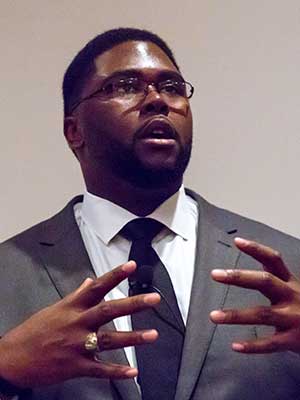Black Men of Amherst, by Harold Wade Jr. ’68, “is a touchstone for a lot of us at Amherst,” says Anthony Jack ’07. And now, four decades after its publication, a second edition of the book is planned—with Jack as its editor.
A Harvard sociologist, Jack is also the College’s current Wade Fellow. The Wade Fellowship commemorates Wade, who died tragically in 1974. (See “His Black History,” cover story, Winter-Spring 2018.) Black Men of Amherst was published posthumously in 1976. The first edition traced the legacy of renowned African-Americans educated at Amherst, from the College’s first black graduate—Edward Jones, class of 1826—to such luminaries as Charles Hamilton Houston, the lawyer and civil rights pioneer from the class of 1915.
“When I was approached with the opportunity of editing a second edition, at first I was scared,” says Jack. “The book means so much to so many people. But, also, how do you say no?” Norm Jones, the College’s chief diversity and inclusion officer, has been instrumental in initiating this second edition and bringing on Jack.

The Wade Fellowship heralds black alumni achievement and connects black alumni with students for career mentorship. “Harold Wade wanted to showcase black excellence in the book,” says Jack, who also believes the second edition must bring “a deliberate conversation of class into dialogue with the conversation about race.” Jack’s own research documents the overlooked diversity among lower-income undergraduates.
When he himself was an undergraduate, Jack first spied a copy of Wade’s book in a friend’s dorm room. That friend, Jordan McKay ’07, was so inspired by Black Men of Amherst that he lobbied to have the portrait of Houston moved from Frost Library to its current prominent place in Johnson Chapel.
Norm Jones and others at the College will be involved in reconceptualizing and producing the book. “I can’t think of a better editor for a second edition of Black Men of Amherst than Tony Jack,” says Jones, “not only because of his commitment to the Amherst community, but also because of his ability to understand the ways in which Harold Wade has influenced so many dimensions of the Amherst experience.”
Photo by Maria Stenzel